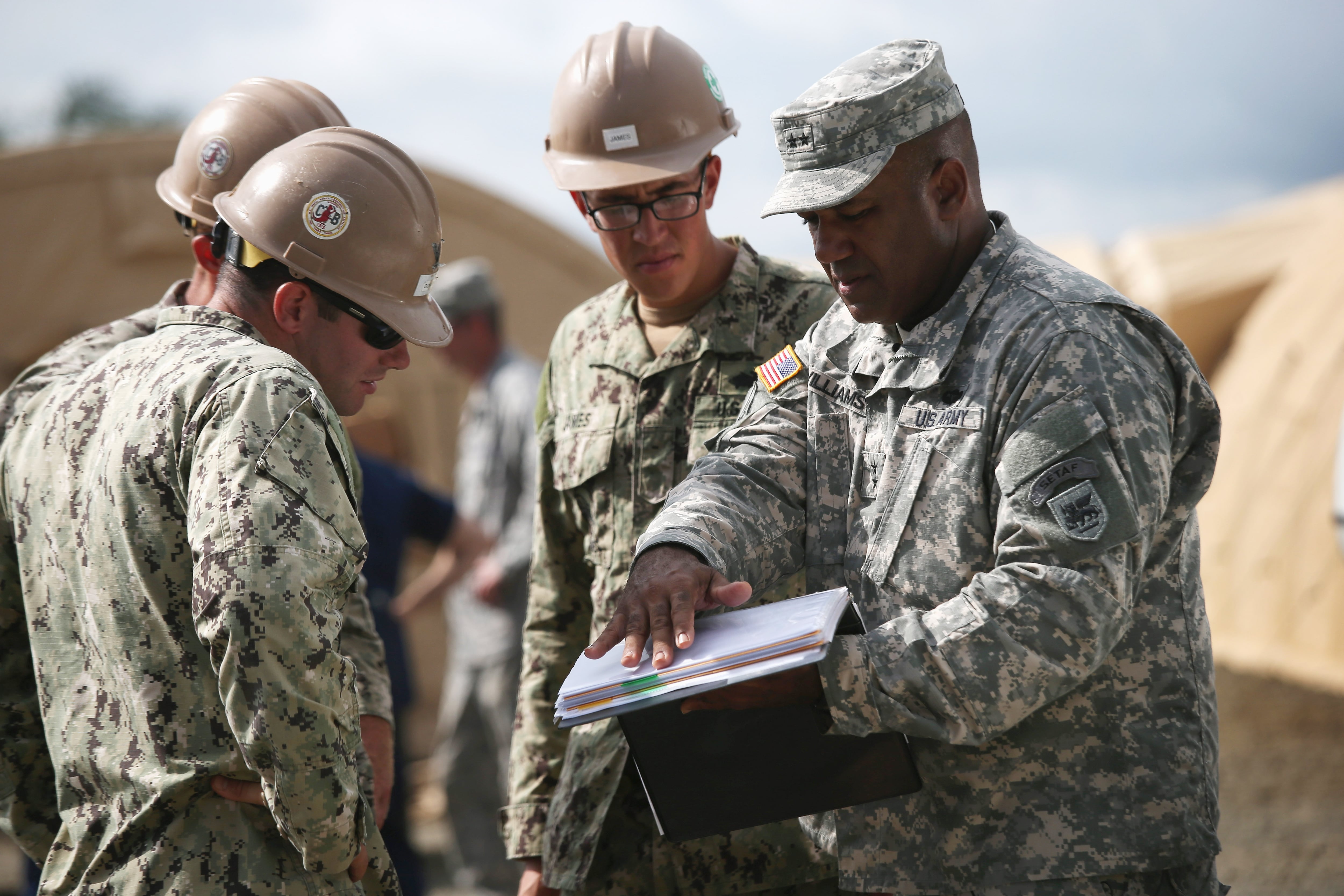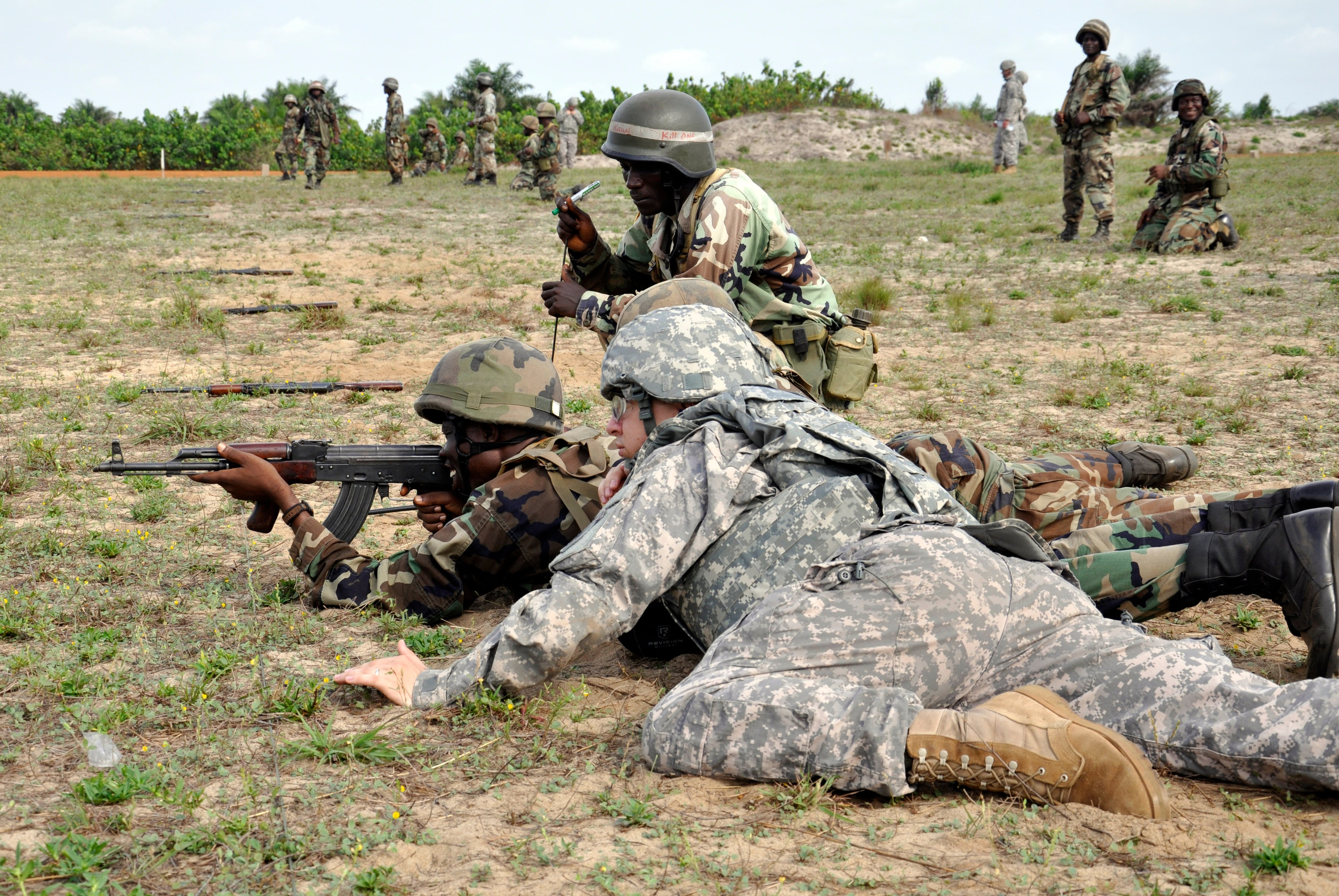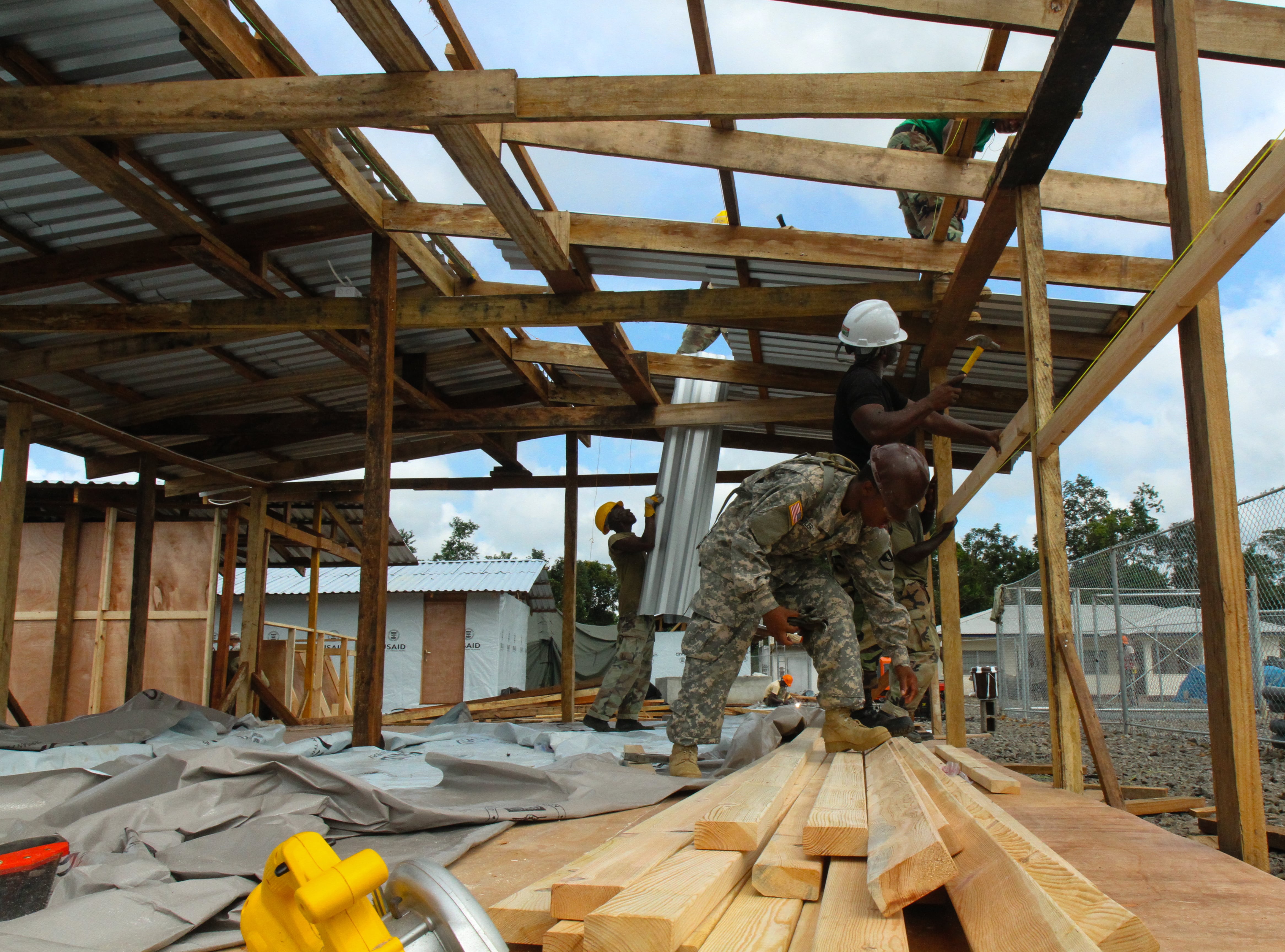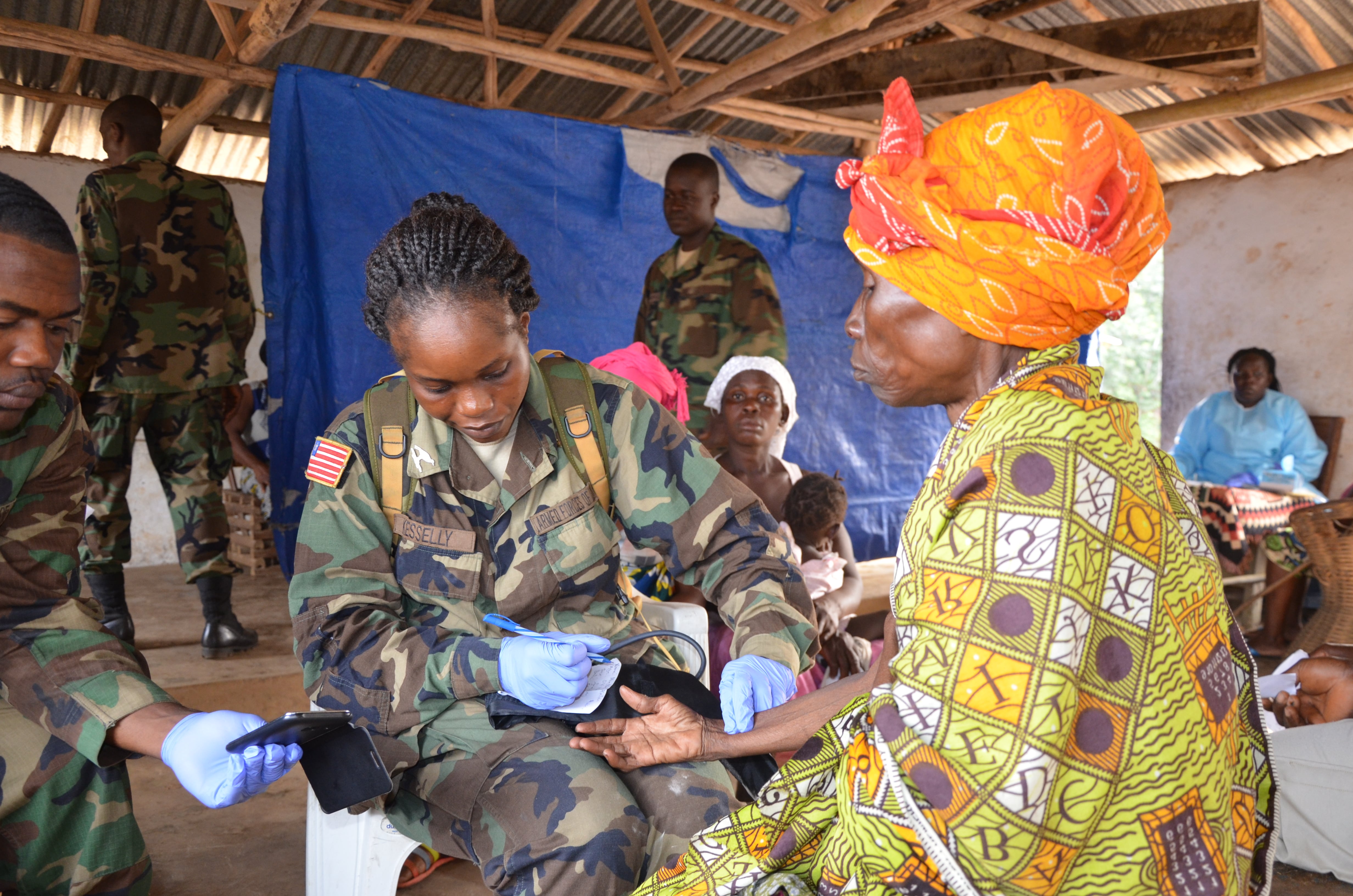It has been almost a year since the U.S. military completed its mission to fight the spread of Ebola, but American soldiers are still in Liberia working with the country's armed forces.
Now primarily working under the umbrella of Operation Onward Liberty, soldiers from the Michigan National Guard work side-by-side with their Armed Forces of Liberia counterparts to train, advise and build capacity.
"The key function Onward Liberty provides us is day-to-day partners who sit on the staff with the Armed Forces of Liberia headquarters, someone who's a trusted mentor and adviser," said Maj. Michael Miller, chief of the Office of Security Cooperation in Liberia.
The U.S. military's extended experience and engagement in Liberia was highlighted Thursday during the country's Armed Forces Day, an annual event and national holiday.
Both the country's president and defense minister praised U.S. troops during their speeches Thursday, Miller said.
"Both of those senior leaders pointed out how important the relationship has been with the U.S. in creating a professional military here that can defend the nation," he said.
Last year, U.S. troops, first led by U.S. Army Africa and later by the 101st Airborne Division headquarters, poured into Liberia to support the U.S. Agency for international Development-led mission to fight the spread of the Ebola virus in western Africa.
Known as Operation United Assistance, the joint forces command was made up of engineers, medical personnel, logisticians and others. They built Ebola treatment units, trained health care workers and built a logistics infrastructure to support the ongoing activities.

Maj. Gen. Darryl Williams, commanding general of U.S. Army Africa, speaks to U.S. Navy Seabees at the construction site of a 25-bed U.S. built hospital for Liberian health workers as part in Operation United Assistance on October 9, 2014 in Monrovia, Liberia. U.S. President Barack Obama committed up to 4,000 troops in West Africa to combat the disease, which has killed at least 3,400 people.
Photo Credit: John Moore/Getty Images
Col. (Dr.) Jim Czarnik, an emergency medicine physician and the command surgeon for U.S. Army Africa, was among the first American soldiers on the ground in Liberia after President Obama announced he was sending troops in to help contain the growing epidemic.
At the time, Czarnik said, the world feared what was going on in Liberia. Many governmental and non-governmental agencies were fleeing the country, and the "fragile health systems" in Liberia, Guinea and Sierra Leone were falling apart.
"There was a tremendous amount of fear because there were huge predictions that if nothing was done, there would be an exponential rise in the cases of Ebola," Czarnik said. "Ebola did not follow borders. It did not care your ethnic background. It did not care your gender."
Obama's decision to send U.S. troops and other resources signaled a turning point in the fight against the virus, Czarnik said.
"Once we got on the ground, just our presence, as one of the first 14 people from the United States Department of Defense on the ground there, it was very powerful," he said. "The people of Liberia really had a sense of renewed hope."
Once the work got underway, the level of cooperation between the Defense Department and the Armed Forces of Liberia was "really unprecedented," Czarnik said.
"It was really an all-hands battle," he said.
There was "shoulder-to-shoulder" work by the U.S. and Liberian troops, he said.
"Many countries have had difficulties with their militaries in the past, and this was a very, very strong message," Czarnik said. "When people saw or heard that Liberian soldiers were swinging hammers with American soldiers and building places for the care of Liberians who were dying, that was a tremendously powerful message."
The arrival of American help and resources encouraged other agencies to stay or return to the fight, too, Czarnik said.
"In that first 45 days, we already saw the Ebola curve start to bend from going straight up to start to level out and drop," he said. "It was because of this collective effort across the board, and, really, the Liberian people who were at the front of this."
Much of the key to stemming the tide of new infections was education and awareness, Czarnik said. This included awareness of the Ebola virus, how it spread and the best ways to practice personal protective elements such as vigorous hand-washing and "very disciplined" wearing of masks and gloves, he said. It also was critical that infected patients were quickly isolated from those who had not been affected by the virus, he said.
"Ebola isn't new to people, but this was the first time it had hit a major population center," Czarnik said. "As a result, we all recognized this was a different kind of Ebola outbreak."
Even after the 101st Airborne headquarters completed its mission and returned to Fort Campbell, Kentucky, last February, there remained a "hypervigilance" to guard against the virus flaring up again, Czarnik said.
Now, a year later, "Ebola in west Africa is largely under control," he said.
"Does Ebola still exist in the environment? Of course it does," Czarnik said. "But because there's heightened awareness, heightened capabilities and discipline, we're able to help prevent it from spreading rapidly."
Since the end of that mission, soldiers from the Michigan National Guard have taken over and continued to deploy to Liberia.
Michigan is partnered with Liberia under the Guard's State Partnership Program. The program, which is more than 20 years old, pairs a state's National Guard with the armed forces or equivalent force of a partner country in order to conduct military-to-military engagement. The program has partnerships with 76 countries — at least a dozen of them in Africa — around the world.

First Lt. Jeremiah Aberlich, a communications mentor deployed from the Michigan Army National Guard, offers shooting tips to his counterpart, Armed Forces of Liberia Capt. Pheophilus Duo during annual weapons qualification at Edward Binyah Kesselly Military Barracks April 2.
Photo Credit: Capt. Bryon McGarry/Air Force
Americans soldiers in Liberia continue to make an impact and grow on the progress made during Operation United Assistance, said Lt. Col. Anthony Barbina, engineering plans and operations chief for U.S. Army Africa.
He cited as a key example Thursday's ribbon-cutting during the Armed Forces Day celebration. The government unveiled two multi-purpose buildings built by the Armed Forces of Liberia.
"When we started Operation United Assistance … we figured out there were engineers on the ground that hadn't done that many projects," he said.
The U.S. military's engineers worked alongside their Liberian counterparts, and, eventually, the Liberians build several Ebola treatment units and have since improved on their skills, Barbina said.
"They really couldn't have done much two and a half years ago, and now, with help from the Michigan National Guard, they've built two pretty complex buildings," he said.
The partnership with the Liberians will continue into the future, Barbina said.
"The military will still be there," he said.

Spc. Quondeshia Butler, center, of the 104th Engineer Company, 62nd Engineer Battalion, 36th Engineer Brigade, works with Armed Forces of Liberia soldiers Pfc. Sammy Joseph, left, and Cpl. Matthew Cooper, of the 1st Engineer Company, 23rd Infantry Brigade, to construct a building for the Ebola treatment unit site in Sinje, Liberia, Nov. 14, 2014.
Photo Credit: Spc. Caitlyn Byrne/Army
Col. Shawn Harris is the current – and last – commander of Operation Onward Liberty. A member of the Michigan Guard, Harris serves as the primary U.S. military adviser to Brig. Gen. Daniel Ziankahn, the chief of staff of the Armed Forces of Liberia. At the same time, Harris' soldiers work with their counterparts on Ziankahn's staff in areas such as engineering, training, intelligence, logistics and noncommissioned officer development.
This is the last rotation for Operation Onward Liberty, which began in 2010 as a way to rebuild the Liberian forces after the end of the civil wars there, Harris said.
"When this first started, the Armed Forces of Liberia was a baby organization in the crawl phase," he said. "As the years went by, the Armed Forces of Liberia grew, and the team has scaled back, and right now we're focused on the higher echelon of leadership."

First Lieutenant Yongor Kesselly, MEDCOM Commander at the AFL Medical Outreach in Tulamue, Liberia Africa, 6 FEB 2016.
Photo Credit: Maj. Shannon Ruby/Army
When the team leaves in August and brings to a close Operation Onward Liberty, the connections to Liberia will not end, Harris said.
One key mission for the soldiers is to make sure the Armed Forces of Liberia are ready for their country's elections in 2017, Harris said. The Americans also are training the Liberians on defense support of civil authorities, paving the way for the military to work with the police and other agencies.
They also will continue to seek training opportunities with the Liberians through the Office of Security Cooperation and Army Africa's theater security cooperation efforts.
"We still want to continue to help," Harris said. "After we leave, I am confident that the Armed Forces of Liberia will be in a position to protect their country and at the same time support the president and the government. This is a testimony to what we have done as the United States."
Michelle Tan is the editor of Army Times and Air Force Times. She has covered the military for Military Times since 2005, and has embedded with U.S. troops in Iraq, Afghanistan, Kuwait, Haiti, Gabon and the Horn of Africa.




